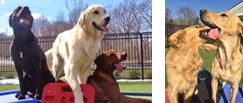If you’re like most dog owners, socialization isn’t the first thing you think about when caring for your dog. You focus on regular vet visits and vaccinations, healthy food, and flea and tick control. Socialization seems like a daunting task that can wait. But, in fact, socialization should be addressed early and treated as a top priority in maintaining your dog’s health.
Dogs that aren’t socialized properly can suffer from poor health, pose a danger to others, and be unable to accept vital medical treatment if needed.
Fear Has a Negative Impact
Being fearful is not only unpleasant for the dog, it causes hormonal reactions in the body that can have negative effects over time. When poorly socialized dogs are continually fearful, several things happen: Adrenaline hormones are released, increasing blood pressure, heart and respiration rates. Corticosteroid hormones are released to increase the dog’s awareness and ability to react quickly. Unfortunately, corticosteroids also decrease blood flow to the kidneys and intestines, encouraging muscle breakdown and suppressing the immune system.
Lack of Exercise
Another result of poor socialization is the tendency for dogs to not get enough exercise. Owners are worried about their dog’s behavior in public and shy away from going out altogether. Unsocialized dogs can run away and get into fights with other dogs, causing harm and potentially expensive vet bills. When exercise is limited, dogs can become overweight and suffer the health risks of obesity.
Inability to Tolerate Vet Care
To ensure a dog’s health and identify any illnesses, vets need to perform complete examinations. This can be next to impossible for poorly socialized dogs that respond to stressful or new situations with aggression. Even using a muzzle is not a solution because it prevents the vet from examining the dog’s mouth and determining dental health, appropriate red blood cell count, and hydration. As a result, owners often choose the easiest solution, which is to forgo medical checkups altogether. This is not a healthy course for the dog.
Insufficient Grooming
Dogs require regular bathing and grooming to keep their skin and coats healthy. Poorly socialized dogs cannot tolerate the stress of a bath or stay still long enough to receive a proper cut. A struggling, fearful dog can potentially harm the groomer and himself. Tranquilizing a dog under these circumstances is not a safe option because it poses unknown risks to the dog. Consequently, grooming is often not worth the risk.
So what is the solution? How do you avoid all these risks and socialize your dog? There are many ways to socialize your dog and help is out there.
Hire an Experienced Trainer
Dogs have a sensitive period for socialization between the ages of 3 and 12 weeks. It is recommended that, during this period, your dog be exposed to roughly 7 new people, objects, and/or situations per week. Hiring a professional trainer to socialize your pup will ensure that the exposures are pleasant and have a positive influence on the sociability of your dog.
Socialization should be an ongoing practice continued into adulthood. It is not enough to socialize your pup only during puppyhood. A dramatic change in your dog’s social contact can be detrimental to his overall confidence and cause him to develop fear or aggression during social encounters. In order to maintain a well-balanced pet, your dog should be exposed to a variety of different people, animals, and situations continuously throughout his life.
[fusion_builder_container admin_label=”” hundred_percent=”no” equal_height_columns=”yes” menu_anchor=”” hide_on_mobile=”small-visibility,medium-visibility,large-visibility” class=”” id=”” background_color=”” background_image=”” background_position=”center center” background_repeat=”no-repeat” fade=”no” background_parallax=”none” enable_mobile=”no” parallax_speed=”0.3″ video_mp4=”” video_webm=”” video_ogv=”” video_url=”” video_aspect_ratio=”16:9″ video_loop=”yes” video_mute=”yes” video_preview_image=”” border_size=”” border_color=”” border_style=”solid” margin_top=”0px” margin_bottom=”0px” padding_top=”0px” padding_right=”0px” padding_bottom=”0px” padding_left=”0px”][fusion_builder_row][/fusion_builder_row] [fusion_builder_column spacing=”” center_content=”yes” hover_type=”none” link=”” min_height=”” hide_on_mobile=”small-visibility,medium-visibility,large-visibility” class=”” id=”” background_color=”” background_image=”” background_position=”left top” background_repeat=”no-repeat” border_size=”0″ border_color=”” border_style=”solid” border_position=”all” padding=”” animation_type=”” animation_direction=”left” animation_speed=”0.3″ animation_offset=”” type=”2_3″]Benefits of Doggie Daycare
Consider enrolling your dog in doggie daycare. A regular routine of group play will expose your dog to other dogs, new people, and different situations. As important as it is to properly socialize, it is equally important to ensure that those interactions are positive and frequent. Enlisting the help of a professional that is trained to read the dog interactions and body language is always a plus.
[/fusion_builder_column][fusion_builder_column spacing=”” center_content=”yes” hover_type=”none” link=”” min_height=”” hide_on_mobile=”small-visibility,medium-visibility,large-visibility” class=”” id=”” background_color=”” background_image=”” background_position=”left top” background_repeat=”no-repeat” border_size=”0″ border_color=”” border_style=”solid” border_position=”all” padding=”” animation_type=”” animation_direction=”left” animation_speed=”0.3″ animation_offset=”” type=”1_3″]
